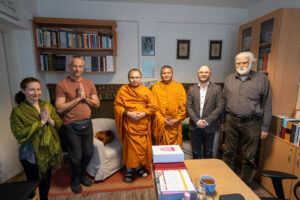The college has recently passed the 20th anniversary of its existence. During this time period the necessary infrastructural conditions were created and the state accreditation acquired.
We are aiming at balancing the student demand and the aspects of societal needs, while planning developments in every strategic area. The accentuated strategic objectives are the building-up of international relations and more visible international representation. Another aim is the expansion of activities and service offered as well as quality development. The next steps to be taken lead us towards the attainment of university status. Its particular status among the institutions of higher education, not only in Hungary but in whole Europe represents a unique allure for the greater community. The fusion of Western scholarly approach and Eastern practical knowledge remains an exceptional factor in Buddhist higher education and can be further exploited in the future.
The college also needs to encourage the publication of both the students’ and the instructors’ academic work on national and even more so on international level. The curricula is under constant development, the recently completed digitalization of all course material in the e-Learning system and the ongoing digitalization of the library provide a good foundation for a movement towards the acquisition of a ‘digital seal’ that would enable the college to tap into the international network of Buddhist education and exchange knowledge to its future improvement. This would also create the possibility for our students to acquire a marketable degree to secure an even higher rate of employment after graduation with more competitive salaries and also opportunities to help the community for which the ethical background and some practical knowledge is already transmitted by college education.

As part of the Visiting Professor Series, and with the support of the Erasmus+ programme, The Dharma Gate Buddhist College (DGBC) welcomed two senior monastic

Within the year-long (2025/26) programme celebrating the 75th anniversary of Hungarian–Vietnamese relations (2025), we warmly invite you to the in-house conference “Thích Nhất Hạnh and